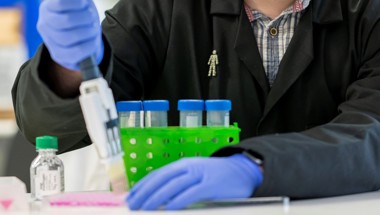
Improving prostate cancer risk estimates for Black men

Grant information
Reference: RWE25-ST2-002
Lead researcher: Dr Harry Green
Institution: University of Exeter
Award: £194,070
What you need to know
- Black men are more likely to get and die from prostate cancer, but the genetic tests used to predict risk were mainly designed using data from white men.
- This project will build better genetic tools using real-world data to make sure risk estimates work properly for Black men.
- If successful, it’ll help doctors give fairer advice and improve early checks, potentially saving lives in the UK and beyond.
Why are we funding this research?
In the UK, around 1 in 4 Black men will be diagnosed with prostate cancer, meaning their risk is around twice that of other men.
Yet the tools doctors use to estimate someone’s risk, especially those based on genetics, have mostly been built using data from white men. That means they might not work as well for Black men, and could even miss signs that something’s wrong.
This research is tackling that problem head-on. It’s using real-world data to see how well current risk tools perform for Black men, and building better ones designed specifically with Black men in mind.
If successful, this work could help shape NHS policies and save lives, not just in the UK but around the world.
What will the researchers do?
The team will start by looking at anonymised health data donated by thousands of men. Alongside DNA samples, this includes information on which men are Black and which men were diagnosed with prostate cancer.
By analysing this data, the team aims to look for key genetic differences that make Black men more likely to develop prostate cancer, including any that aren’t factored into existing genetic tests. That might be because they’re rare among white men, so have been overlooked in existing research, or because they have a different effect on Black men.
Next, the team will use this information to build a new genetic risk tool that’s designed specifically for Black men. This tool will look for these key genetic differences to estimate a man's chance of developing prostate cancer.
They’ll also compare this test to ones currently available, to see whether it is better able to estimate a Black men’s risk of developing prostate cancer.
Importantly, alongside the data work, the team will speak with Black men and community groups to make sure the research reflects real-life experiences. They’ll also explore how current policies on genetic testing, screening and follow-up care might treat Black men differently – for better or worse.
And they’ll use this insight to guide the project and help shape how the findings are shared with doctors, policymakers and the public to ensure that men and their doctors are fully informed about risk, and to reduce the disparities facing Black men.
High-profile calls for prostate cancer risk tools – such as genetic tests – to be offered to Black men may widen existing health disparities, as these tools often work poorly for Black men. This funding will enable us to generate urgently needed real-world evidence to ensure genetic tools work equitably for Black men, advancing inclusive cancer risk prediction and shaping national policy to reduce racial disparities.
How will this benefit men?
By building better tests that are designed with Black men in mind, and working with them to understand the healthcare barriers they face, this project could drastically improve the way our healthcare system supports Black men at risk of prostate cancer.
That could lead to fewer Black men being diagnosed late, improving their chances of a cure and closing the gap with white men.
The team will also look for rare genetic changes that current NHS tests might miss. If they find any that strongly increase risk, they can recommend adding them to NHS tests - again, making it more likely that Black men can get diagnosed earlier and treated sooner, saving and improving lives.
Help us fund more research like this
Your donation helps us fund lifesaving research to improve the way we diagnose prostate cancer.



